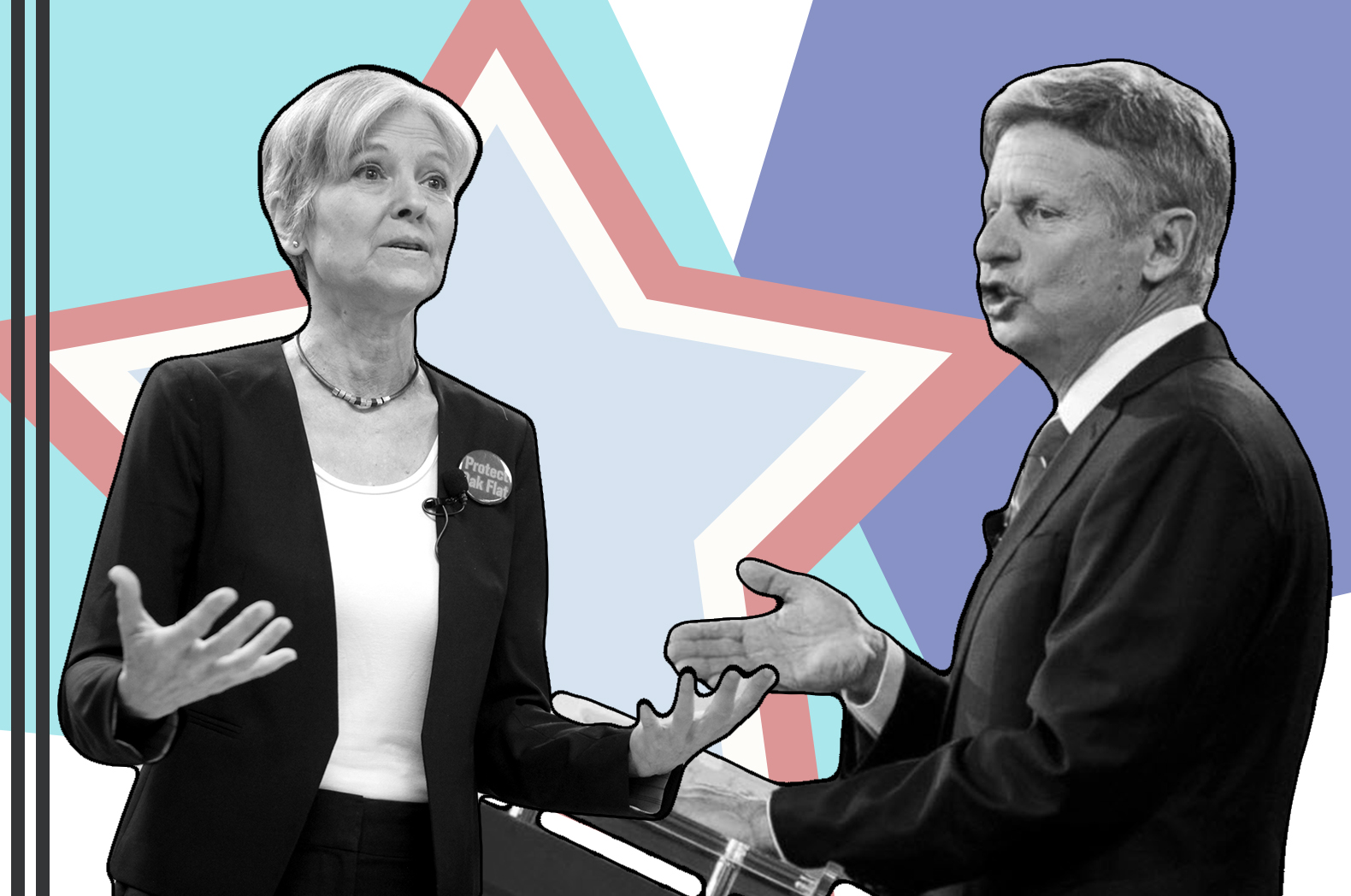Disrupting the System for an Awful President is Useless

Candidates Jill Stein (Green Party) and Gary Johnson (Libertarian Party)
LOOKING BACK ON THE 2016 PRESIDENTIAL ELECTIONS , it seems as though Sen. Bernie Sanders (I-VT) threw his hat into the ring, and single-handedly inspired a generation of voters to cast their ballots in protest of the two-party system and all it represents. Now that Sanders has dropped out of the race and thrown his weight behind Democratic Party candidate Hillary Clinton, many have touted third-party candidates Gary Johnson and Jill Stein as the inheritors of his legacy, the final disruption needed to topple the control that the major parties have long held over U.S. politics.
During an appearance on MSNBC’s Morning Joe , Sanders warned against the allure of the protest vote, urging viewers to “think about what the country looks like and whether you’re comfortable with four years of a Trump presidency.” The longest-serving Independent senator advised those considering Johnson and Stein to vote for third-party candidates down the ballot, but stated unequivocally, “This is the time to elect Hillary Clinton.”
Unfortunately, Sanders’ words may not reach a receptive audience, even where his former supporters are concerned. After Sanders dropped out of the race and endorsed his former rival, some Bernie Bros were quick to put the Vermont senator on blast for what they considered “selling out” to the political powers that be. Their ire ignored the fact that Sanders’ policies brought revolutionary changes for the better to the 2016 Democratic Party platform .
We’re in a similar situation now. What many protest voters fail to consider is that disrupting the system for a terrible president is pointless. Sanders’ effect on the system has already happened. And although those positive changes are just as easy to lose as the progress we’ve made under Obama’s two terms, they will stick around if we don’t risk the presidency and continue to champion progressive causes over the next four years.
A Sanders presidency would have been the ultimate disruption: proof that an Independent candidate could win the highest office with nothing more than good policy and integrity. If the original plan for disruption was to elect Sanders, then the decision to cast a protest vote amounts to nothing more than holding one’s breath like a petulant child.
Putting an inept candidate into the Oval Office in the name of protest, however, does nothing but send the message that political independents and outsiders cannot be trusted to vote responsibly. Worse still, should either of the 2016 third-party candidates make it into office — which Internet memes will assure you could happen, if every lax voter turned out for them — their inexperience would almost certainly lead the U.S. at large to the conclusion that third-party candidates make bad presidents.
That’s the opposite of disruptive. If you truly want to see the two-party system demolished, you know that the way to do it is not by tossing all of Sanders’ progress onto a dumpster fire . Instead, we must harness the chaos that allowed both Sanders and Trump to garner widespread support , and use it to bring sweeping, progressive change to the U.S.
Don’t worry, the chaos isn’t going anywhere. Jonathan Rauch’s full analysis of “How American Politics Went Insane” is well worth the read, but here’s a nugget to chew on. From the article:
Trump, Sanders, and Ted Cruz have in common that they are political sociopaths — meaning not that they are crazy, but that they don’t care what other politicians think about their behavior and they don’t need to care. That three of the four final presidential contenders in 2016 were political sociopaths is a sign of how far chaos syndrome has gone. The old, mediated system selected such people out. The new, disintermediated system seems to be selecting them in.
The point behind protest votes has already been made. Sanders and his supporters have proven that a third-party candidate can make a viable bid for the presidency and shape the policies of a major party. That means we have a hope of seeing better and more qualified presidential candidates than Johnson and Stein. Provided that we maintain the progressive momentum Obama, Clinton, and Sanders have set in motion, the election of a third-party president will come sooner, rather than later.
It may not come at all, however, if we allow a Trump presidency to happen. And it certainly won’t come in our lifetimes if we let a candidate with slim-to-no political experience and/or knowledge taint public opinion as the first non-major-party president in recent memory.
Simply put, the bar has been raised. Sanders has urged us all to hold out just a little while longer, to disrupt when the time is right. We owe it to ourselves to listen. We owe it to future generations to preserve the image of the third-party. If it still rubs you the wrong way, just think of it as waiting on a candidate who’s worthy of Sanders’ legacy.
